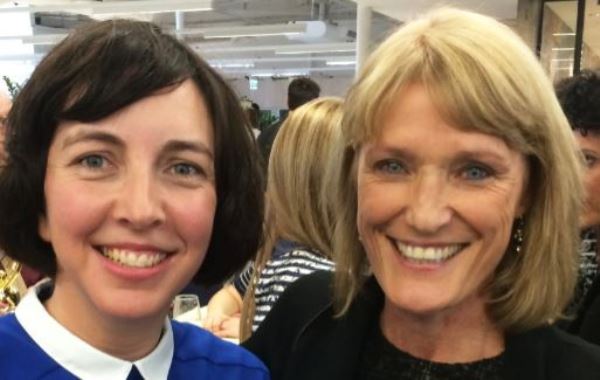Courtney Botfield and Tracey Mair.
The Goodship Agency, a new venture by film distribution and marketing specialists Tracey Mair and Courtney Botfield, is one of 13 screen businesses supported by Screen Australia’s Gender Matters: Brilliant Careers fund.
Goodship designs and implements innovative pathways for the financing, distribution and marketing of Australian film, television and on-line productions – both narrative drama and documentary.
According to the founders, the Screen Australia funding will enable the company to employ a brand integration specialist to create funding and marketing partnerships between screen content and corporates and brands.
Goodship focuses on productions with strong social change messaging and those that offer opportunities for brand alignment.
“We’ve identified a gap in the market that weaves traditional film distribution with impact producing and corporate brand partnerships with the ultimate goal of building audiences for Australian screen content,” Botfield says.
Botfield is the former GM of Transmission Films and recipient of the 2015 Natalie Miller Fellowship, with experience managing the distribution campaigns for films such as The King’s Speech, Samson & Delilah, The Railway Man, Balibo, Burning Man, Mad Bastards and Shame.
Mair has worked film and television industry for more than 25 years. Her company, TM Publicity, works across production, distribution, broadcast, exhibition and strategic communications.
“For much of our careers we’ve seen a disconnect between production and marketing,” Botfield says. “For most Australian films, marketing partnerships – if any – are secured during the final distribution or broadcast phase. There is not the time to build a long-term strategic partnership that can help build and grow an audience. Goodship closes the gap.”
“At Goodship, we negotiate financing, philanthropic and brand partnerships for Australian screen content, and we begin as early as possible in the development of a project, always with an eye for those partnerships to be in the service of building communities and ultimately audience. We find the partners and manage the relationship throughout the life of the project.”
Goodship worked with the producers of Sherpa on partnerships with Kathmandu and Intrepid Travel. The partnerships saw the companies promote Sherpa to their larger customer data bases (and in store) as well as provide an opportunity for them to fulfill their social responsibility remit by using the film to fund raise for the rebuild Nepal effort after the devastating 2015 earthquake. The partnerships began in post production and continued through Australia and NZ festival, theatrical and home entertainment windows.
Botfield says that Goodship is a response to the rapidly changing landscapes of film distribution and audience consumption models.
“New technologies have seen seismic changes in release models and audience viewing behaviour. While no-one knows where the technology will land, the inescapable truth is that producers, distributors, broadcasters and marketers need to radically rethink pathways to audience. At the same time, as advertising platforms fragments, brands are looking for new and interesting ways to connect with customers.
“In the spirit of embracing these current industry trends, we believe we have identified a gap in the market that bridges these two worlds,” Botfield says.
The pair will also draw on their years of distribution experience to develop and implement effective impact and outreach campaigns.
“Currently there are impact producers in the Australian arena working specifically with social change documentaries, there are agencies focused on product placement and branded entertainment, and there are distributors working in the traditional, digital and cinema on demand spaces, but only Goodship brings together their expertise to design and implement strategies across all of these areas of screen finance, distribution and marketing. Our ambition is global and focused; our remit is to build audiences for Australian stories both domestically and around the world,” Mair says.
A core principal of Goodship is to identify and redress the consistently poor representation of women in creative and business leadership roles in the screen industry, particularly across the distribution and exhibition sectors where men are predominantly making the crucial decisions about when and how we see product.
In choosing projects, Botfield and Mair have set themselves a target that 75 percent be driven by Australian female creatives and female stories.
“We believe this target will help redress the under representation of female directors, producers and writers in Australian film and television as well as ensure that more women’s stories make it to the screen. We firmly believe that films for women constitute an under-exploited cinema market in this country and that there is, therefore, a real opportunity to grow audiences for Australian films by targeting this market,” says Mair, who co-edited last year’s AFTRS’ publication LUMINA special edition on Women in Film.
Goodship’s current projects include The Baulkham Hills African Ladies Troupe (directed by Ros Horin), for which it has taken domestic distribution rights, the multi-platform youth series Deadlock being developed by Every Cloud’s Fiona Eagger and Deb Cox, the film adaptation of Charlotte Wood’s novel The Natural Way of Things, with emerging producer team of Katia Nizic and Emma Dockery, Werner Film Production’s Dance Academy The Movie, Kathryn Millard’s feature documentary Shock Room, feature film Vida La Vida (producer Julie Ryan, writer Lisa Hoppe, director Emma Freeman), Warwick Thornton and Brendan Fletcher’s documentary We Don’t Need A Map, and Andrew Pike’s documentary Pumphead.



